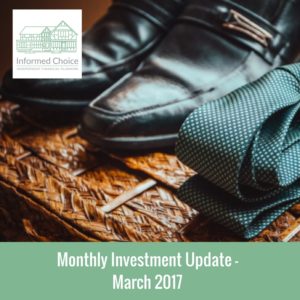 In our latest monthly investment update for March 2017, we look at how the investment markets, global economy and commodity prices are performing.
In our latest monthly investment update for March 2017, we look at how the investment markets, global economy and commodity prices are performing.
The FTSE 100 index of leading UK company shares finished February at 7,263.44 points, rising by 164.29 points or 2.3% during the month.
European markets finished the month with a quieter period of trading, as investors waited for President Trump’s first address to Congress overnight on Tuesday.
During February, European stock markets performed well against the positive backdrop of the European Commission’s Winter 2017 Economist Forecast.
According to the forecasts, the Eurozone is expected to grow by 1.6% in 2017 and 1.8% in 2018. Advanced economies outside the United States are forecast to benefit from the spillover effect of economic activity in the US. European exports are also expected to get a boost from the rising interest rate and the US dollar.
In the latest quarterly reshuffle of the FTSE indices, Dixons Carphone is expected to be demoted from the FTSE 100 index, replaced by Scottish Mortgage, the investment trust run by Baillie Gifford.
Also set to leave the top flight, based on its market capitalisation at the end of February, was Capita, Easyjet and Intu Properties. Rentokil Initial and the packaging company DS Smith could both be promoted.
The UK manufacturing sector continues to grow in February, putting it on track to deliver its strongest quarterly performance in three years. The latest Markit/CIPS Purchasing Managers’ Index reading was 54.6; this was down from 55.7 in January and slightly below the City of London consensus forecast of 55.6. An index reading above 50 represents growth.
According to Rob Dixon, an economist at Markit, the readings in January and February were consistent with first quarter manufacturing sector growth of 1.5%, which would represent the strong quarterly expansion since the first quarter of 2014.
Investors in the US are pricing in an interest rate hike this month, with dollar and US Treasury yields trending higher. Comments from some Federal Reserve policymakers suggested rate-setters are worried about waiting too long to raise interest rates, in light of pending economic stimulus out of Washington.
According to Reuters, investors have priced in a 68% probability of an interest rate rise in March, up from 30% the month before.
In Japan, capital spending by domestic businesses rose by 3.8% year-on-year in the final quarter of last year. The government figures show this marking a turnaround for Japanese companies as they seek to boost output. Capital spending has long been a weak point for the Japanese economy, with businesses reluctant to invest when the economic outlook is uncertain.
In the UK, price inflation has risen to its highest rate for two and a half years. The Consumer Price Index (CPI) measure of price inflation rose to 1.8% for the year to January, up from 1.6% in December. This is the fourth consecutive month of inflation rises and takes CPI inflation to its highest level since June 2014.
Price inflation in the UK remains below the Bank of England target of 2%, last reached in December 2013. The Bank is expecting inflation to reach 2.7% next year.
Consumer inflation as measured by the Retail Prices Index (RPI), which includes some housing costs, rose to 2.6% in January, up from 2.5% in December.
House price growth accelerated in February, according to the latest Nationwide survey. Average property values rose by 4.5% during the year, up by 0.6% compared to the previous month. This makes the average cost of a home £205,846. Nationwide has forecast an uncertain outlook for house prices in 2017, with modest 2% annual growth.
The Bank of England Monetary Policy Committee kept interest rates on hold at 0.25% during their meeting at the start of February. A forecast from accountancy firm Moore Stephens suggested that an extra 18,000 people could face insolvency by 2020 if interest rates were to rise by 1%.
Most economists expect the Bank to keep interest rates on hold at least until the end of next year, although they could face growing pressure to hike up interest rates should price inflation continue to rise.
Oil inventories in the US reached a new high at the end of February, with the American Petroleum Institute reporting a build of 2.502 million barrels. Despite this US inventory build-up, the OPEC agreement to cut output appears to be holding, with compliance of 94% in February. Brent Crude Oil Futures were $56.81/barrel at the start of March.
The benchmark 10 year UK Gilt yield stands at 1.185% at the start of March, falling during February.
£1 buys $1.23720 or €1.17410. The Forex Gold Index is $1,255.60/oz and the Silver Index is $18.28/oz.

